Nature lovers always wonder about do butterflies bite? Many people appreciate the beauty of butterflies and often see them as a symbol of sophistication and freshness in nature. But about the dangers, let’s find out with bazyfarmbutterfly.com.
What are butterflies?
Butterfly is a type of insect belonging to the order Lepidoptera in the class Insecta. They are known for their slender wings called “places” and their beautiful, unique physique. Butterflies have a special development cycle, including stages from eggs, larvae, pupae to adult butterflies.
Butterflies have an extremely rich diversity of colors, shapes and sizes. Some butterfly species are even capable of simulating eyes and faces to deceive opponents or predators. They often participate in plant pollination through the transmission of pollen during nectar feeding.
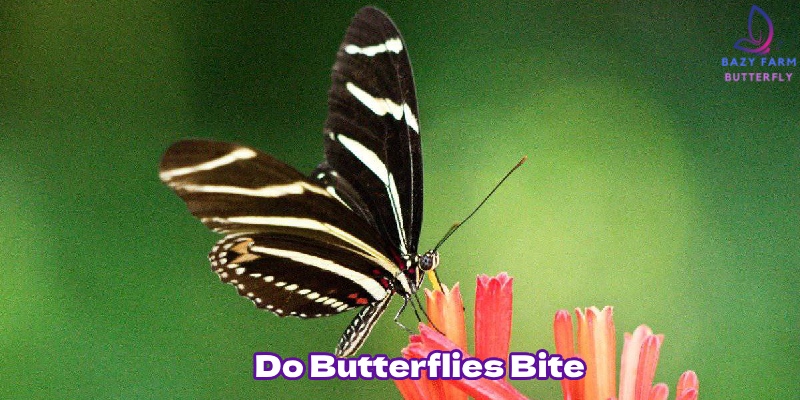
Do butterflies bite?
No, butterflies don’t bite. Butterflies don’t have teeth so they will be very difficult to bite!
Butterflies do not have any type of hairs, stingers or even the ability to bite not only humans but also other insects or animals. Their tube-like proboscis is a tongue used to suck up liquids. In addition, other insects such as mosquitoes also use tubular proboscis to suck blood; however, the butterfly’s proboscis is not designed for this type of feeding.
Butterflies feed with their proboscis. When a butterfly feeds, it extends a long, thin tube to suck up nectar or other liquid it wants to take in. Think of its spout as a straw that you can use to enjoy your favorite drink. When a butterfly finishes drinking its meal, it will curl its proboscis so that it will not be hindered as it flies into the air.
Are butterflies harmful?
Toxic species
Some butterflies, especially in the caterpillar larval stage, may be toxic or contain harmful chemical compounds if swallowed. For example, Monarch caterpillars sequester toxins from the milkweed plants they eat, making them toxic to many potential predators. Ingesting these toxins can harm animals that try to eat them.
Agricultural pests
Although butterflies themselves are not agricultural pests, their caterpillar (larval) stage can sometimes be considered a pest. For example, white cabbage moths, known as cabbage worms, can damage crops such as cabbage, broccoli and other cruciferous vegetables.
Transmission
Although rare, some studies show that butterflies have the ability to carry and transmit diseases. However, this is not a significant concern compared to other disease vectors such as mosquitoes and ticks.
Allergic reaction
Although extremely rare, some individuals may be allergic to butterfly scales or other parts of the butterfly’s body if they come into contact with them. These reactions are usually mild and uncommon.
Surely you are still curious that do butterflies bite? Please continue to follow so you don’t miss any information.
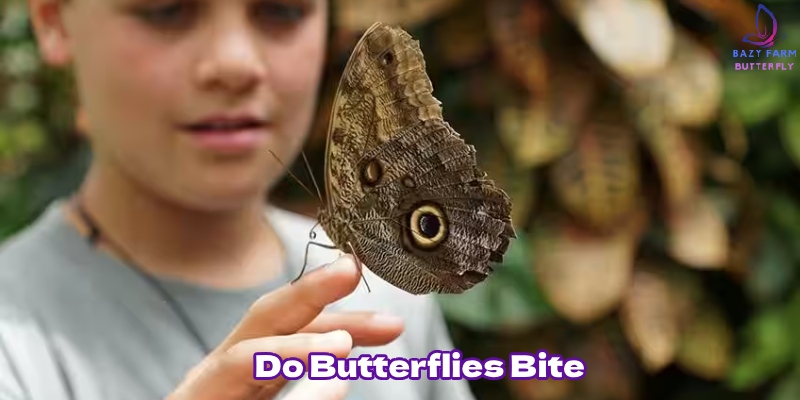
Living conditions of butterflies
Global Distribution
Butterflies can be found on every continent on Earth, except Antarctica. Their widespread distribution demonstrates the ability of butterflies to adapt to a variety of climatic and environmental conditions.
Habitat
Butterflies can exist in many different environments, including forests, parks, gardens, prairies, and even urban areas. This demonstrates their ability to select and find food sources in a variety of environments.
Trees Are Important Habitats
Most butterflies depend closely on trees as their habitat. Different types of plants can provide living conditions and food for larvae and adult butterflies. The interaction between butterflies and plants is important for both types of organisms.
Climate
Butterflies adapt to many different climates, from hot and humid climates to arid climates. Some butterfly species migrate annually to avoid cold climates, while others adapt to stable climatic conditions.
Lighting Conditions
Light plays an important role in the life of butterflies. Butterflies are typically active during the day and require sunlight to be active and forage.
Surely you are still curious that do butterflies bite? Please continue to follow so you don’t miss any information.
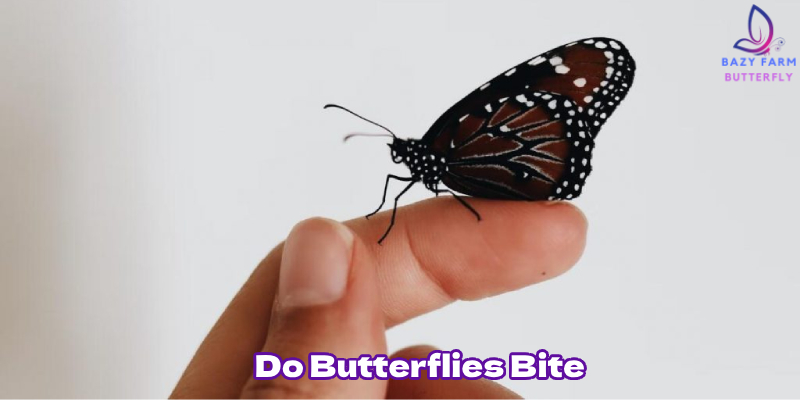
Do butterflies bite? Butterfly feeding behavior
Consumption of Honey and Nectar
How to Eat and Drink
Butterflies often use a siphon, a tube-like organ, to suck nectar and nectar from flowers and other food sources.
The butterfly’s suction chamber can be kept rolled up when not in use and opened when needed.
Relations With Flowers and Nectars
Tree Pollination
Butterflies mainly pollinate plants when they land on flowers to absorb nectar. During this process, pollen attaches to the butterfly’s body and is transferred from flower to flower, contributing to plant pollination.
The interaction between butterflies and flowers is important for both types of organisms, especially in maintaining biodiversity and reproduction.
Food Diversity
Larvae Eat Leaves
During the larval stage, some butterflies eat leaves as their main food. Larvae often select specific plants and use a variety of strategies to avoid recognition by predators.
The variety of plants the larvae eat helps regulate butterfly populations and maintain ecological balance.
Reproductive and Larval Cycle
Place Eggs
Butterflies often lay their eggs on plant leaves, where the larvae will later feed. This creates a connected cycle between the adult and larval butterfly’s food.
Surely you are still curious that do butterflies bite? Please continue to follow so you don’t miss any information.
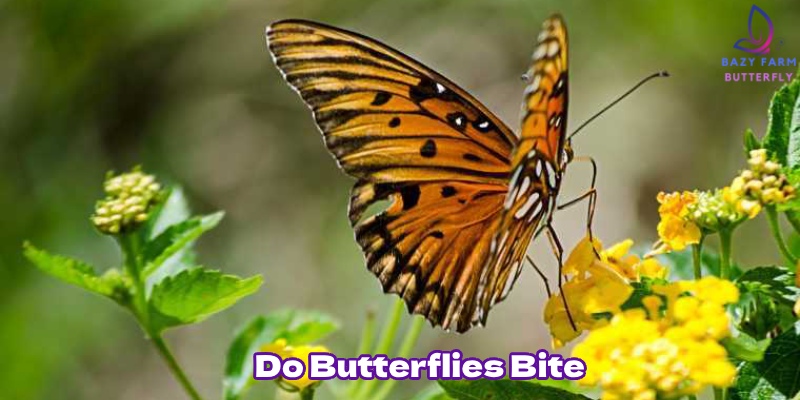
Do butterflies bite? Some types of butterflies are poisonous
Bite Butterfly
Pieridae
Some species of water butterflies may be capable of biting. This usually happens when they are in the larval or adult butterfly stage.
Monarch Butterfly (Papilionidae)
Some species of monarch butterflies are also known to bite, especially when they are in their larval stages.
Reasons for Biting
Protect Yourself
In some situations, butterflies may bite to protect themselves from predators or when they feel threatened.
Eating habit
Water butterflies may bite because they are often exposed to aquatic environments, where nectar may be scarce and they need to search for other food.
Special Context
Mating Period
In some cases, during the mating period, butterflies may exhibit biting behavior, often as part of the mating process.
Stress or Overpowering Conditions
Butterflies may bite when they are stressed or feel they are being dominated by their environment.
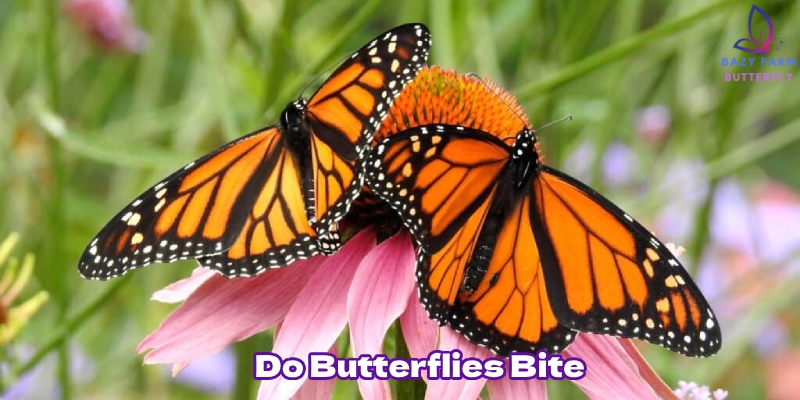
In conclusion
We have explained in detail about do butterflies bite? However, it is important to note that some butterfly species may contain toxic chemicals or compounds in their bodies or wings as a defense mechanism against predators.
